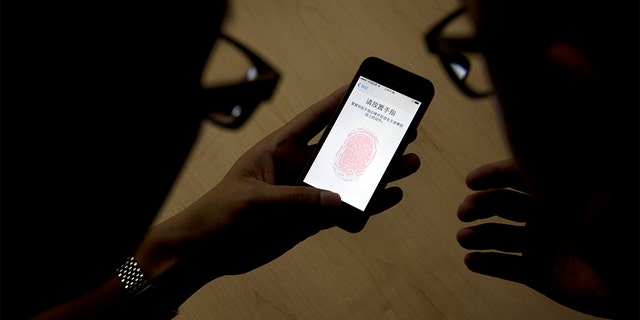NEWYou can now listen to Fox News articles!
Online privacy is an oxymoron. For example, there’s an advertiser ID on your phone that’s supposed to keep your location anonymous. Are you surprised it doesn’t? Me neither. Tap or click here for steps to see and remove your advertiser ID.
It’s not always advertisers and Big Tech spying. A stranger or someone you know might be poking around your accounts. Tap or click for a quick check you must do to keep your Facebook, Google, and Netflix accounts secure.
Privacy isn’t a given. Here are five ways to take as much as you can back.

It’s not always advertisers and Big Tech spying. A stranger or someone you know might be poking around your accounts. (AP)
1. Everyone’s least favorite kind of cookie
You collect cookies when you browse the web on your phone, computer, or tablet. These bits of data store information about the websites you visit. Cookies store your logins, personalization settings, advertising information, and other details.
The upside is that cookies save images and files and stop you from having to log in every time you visit a site. But these cookies contain a lot of your details. Fortunately, you can delete cookies manually in a few steps.
Tap or click here to delete cookies from your phone. Hit this link for steps to clear cookies from your computer’s browser.
Better yet, use Incognito Mode. When you surf the web Incognito, your browser doesn’t save your history, cookies, site data, or information you enter in forms. It does keep any downloaded files or bookmarks created during the session.
Exclusive limited-time offer: As a special thank you to my readers, I'm giving you a free Windows or Mac guide full of tips, tricks, and great downloads. Claim your free Windows or Mac guide now at my website at Komando.com/FreeGuides.
Be warned: Your internet service provider can still see your activity, as can a school or employer providing your internet access or computer.
To go incognito on Google Chrome or Microsoft Edge, press Ctrl + Shift + N (or Command + Shift + N on Mac). Tap or click for three times you should always browse Incognito.
For even more privacy, fire up a VPN. A virtual private network, or VPN, is a layer of protection between your devices and the internet. It hides your IP address and your location. It also encrypts your data after leaving your device and traveling to whatever website you’re visiting.
Don’t even think about using a free VPN. At best, it will lack the necessary privacy features and slow you down. At worst, it's hiding malware or tracking your information. My pick is ExpressVPN, the VPN I used before they became a sponsor of my national radio show.
2. Your emails are a wealth of information
Just think about everything sitting in your inbox. In the wrong hands, those digital messages can do much damage.
Encryption is a method to protect your email from hackers, criminals, and prying eyes. It's a process where your email messages are scrambled, so if hackers manage to intercept them, all they'll see is gibberish.
Big-name email services like Gmail and Yahoo don't provide end-to-end encryption. Encryption is tough to implement, and it generally requires all correspondents to participate. The process isn't end-to-end if your email uses encryption, but mine doesn't. At some point, your message will be vulnerable.
If encrypting your emails is essential, you'll need to switch to a secure service like StartMail, ProtonMail, Mailfence, Tutanota, or Hushmail.
Use Gmail? You can send a Confidential email. Email sent in Confidential mode can't be forwarded, and you can choose whether to require a recipient to use a passcode to read it. Tap or click here and scroll to No. 3 for steps to try it yourself.

A Google sign inside Google headquarters in Mountain View, Calif. Use Gmail? You can send a Confidential email. Email sent in Confidential mode can't be forwarded, and you can choose whether to require a recipient to use a passcode to read it. Tap or click here and scroll to No. 3 for steps to try it yourself. (AP Photo/Paul Sakuma)
3. Your apps are watching where you go
Your phone knows precisely where you’ve been over the past few days, weeks, and even months. If it’s been a while since you looked at your phone’s location settings, do it now.
Check this hidden location setting on your iPhone:
Click Settings, then Privacy.
Select Location Services, then scroll down to System Services.
Choose Significant Locations to see the record of where you’ve been and toggle it off.
Here’s how to adjust location settings on an Android:
Open Settings, then scroll down and tap Location.
To stop all tracking, you can toggle Use location off.
If you don’t want to remove all permissions, tap App location permissions.
For each app, tap it to choose your preferred setting: Allow all the time, Allow only while using the app, Ask every time, or Don't allow. You can also decide whether an app sees your precise location or an approximate location.

Netflix executive Reed Hastings. (Getty Images)
4. Your TV is watching you right back
Sorry to break it to you. Your streaming services are tracking your activity, too. It makes sense. Netflix, Hulu and all the rest want to know what shows you like so they can recommend content you’ll enjoy and don’t mind paying for.
The monitoring isn't for your benefit, though. Streaming services collect your viewing history and the ads you watch or skip. Then, they share this data with advertisers.
Tap or click here for a step-by-step guide on deleting your history on Netflix, Hulu and more.
If you have a smart TV, you have essential settings to review there, too. Tap or click to stop your Samsung, LG, Amazon Fire TV, or Roku TV from spying.
5. Stop sharing everything you buy and browse
Google always seems to know just what you want, and it’s not in your head. Google tracks every search, click, message, and request. Now and then, clear your search history and activity. Here's how:
Go to myaccount.google.com and log in. Alternatively, go to google.com and click the circle icon in the upper right-hand corner with your image or initials inside. Then click Manage your Google Account.
Click Data & Privacy in the left-hand menu.
You will see checkmarks next to Web & App Activity, Location History, and YouTube History. Click each one to adjust your settings. Toggle them off to stop further tracking if you choose.
On these pages, you can also set up Auto-delete for future activity. I highly suggest you enable this. You can choose from 3 months, 18 months, or 36 months.
Don’t stop there. Tap or click for more Google privacy settings you can change now.
PODCAST PICK: Clone dead voices, crypto fraud, hacked hot tubs
Want your dead grandmother to read you a story? If Amazon's new Alexa AI feature comes to life, you could clone dead voices. Plus, hackers are taking over hot tubs, Anna Sorokin is selling NFTs, and the FBI warns of crypto fraud on LinkedIn. You won't believe how much money Big Tech companies make per minute.
Check out my podcast "Kim Komando Today" on Apple, Google Podcasts, Spotify, or your favorite podcast player.
Listen to the podcast here or wherever you get your podcasts. Just search for my last name, "Komando."
What digital lifestyle questions do you have? Call Kim's national radio show and tap or click here to find it on your local radio station. You can listen to or watch The Kim Komando Show on your phone, tablet, television, or computer. Or tap or click here for Kim's free podcasts.
Copyright 2022, WestStar Multimedia Entertainment. All rights reserved. By clicking the shopping links, you’re supporting my research. As an Amazon Associate, I earn a small commission from qualifying purchases. I only recommend products I believe in.
Learn about all the latest technology on The Kim Komando Show, the nation's largest weekend radio talk show. Kim takes calls and dispenses advice on today's digital lifestyle, from smartphones and tablets to online privacy and data hacks. For her daily tips, free newsletters, and more, visit her website at Komando.com.
Article From & Read More ( Privacy Tip: 5 ways you’re being tracked you must stop right now - Fox News )https://ift.tt/HY2TzkI
Technology
No comments:
Post a Comment